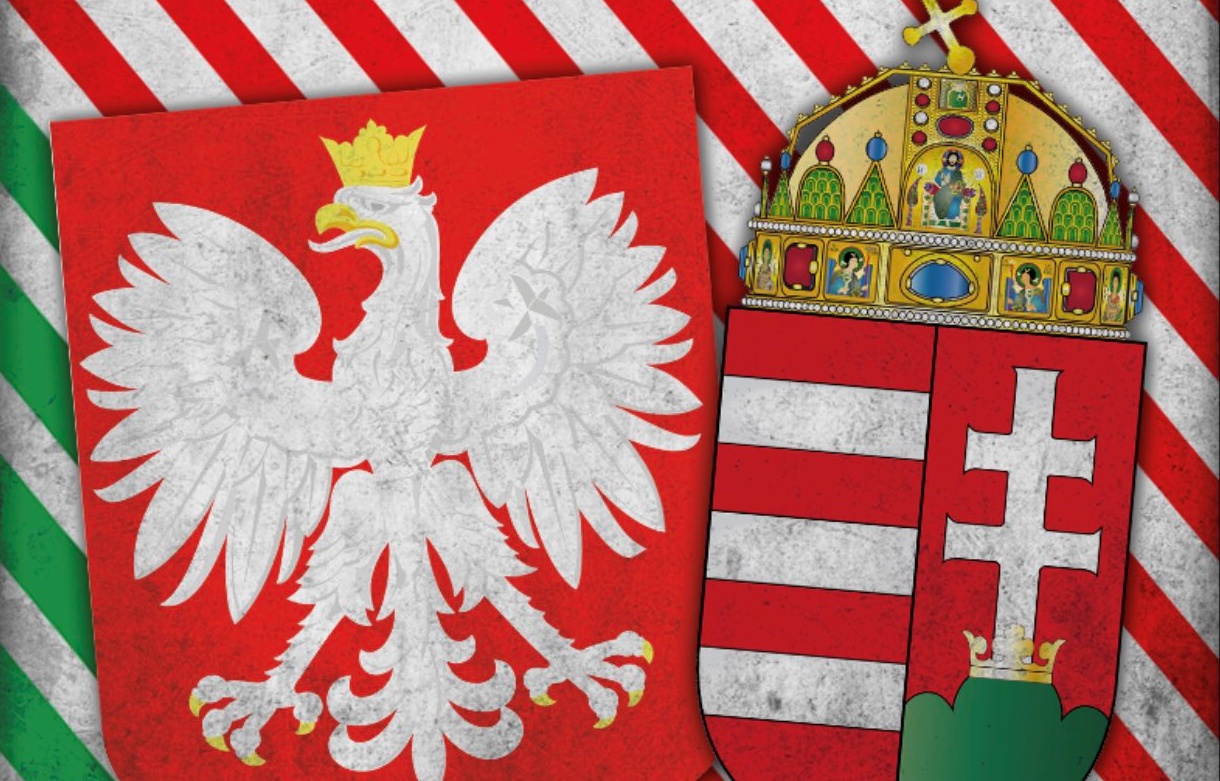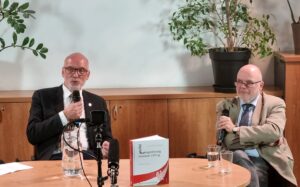
"Hungary's example gives courage, a courage that is contagious."Continue reading

We have met Professor Andrzej Nowak of the Jagiellonian University and the Institute of History of the Polish Academy of Sciences in Budapest during his book-talk organized by the Waczlaw Felczak Foundation. We have asked the prominent Polish historian, author of over 40 books, about the current challenges of Polish-Hungarian relations and his hopes for a new revival.
Last week we have listened to the presentation of your book, “The History of Poland until 1202” here in Budapest. One thing shined through: the relations with Hungary were of fundamental importance right from the beginning of the second millennium. This shared ethos about Polish-Hungarian brotherhood is certainly not a cliché invented by politicians, as some have suggested. What makes our historic coexistence in this region so special?
Our statehoods began roughly at similar times, the end of tenth century, when we have emerged as important members at the European scene. What is even more important was the fact that both our countries have received Christianity from a Western source, from Rome, the Latin world, at the same time. Furthermore, our countries started their political careers as independent kingdoms at the same time. To be precise, Hungary 25 years before Poland. For quite a long time they were alone as independent kingdoms in Eastern-Central Europe, to the East of the German Kingdom that was in the process of becoming an imperial power. Placed on the border between Eastern Christianity, represented by the Kievan Rus, and the Latin world, these two kingdoms built important ties through their common circumstances.
They wanted to preserve their independence, they wanted to stay Latin Christian. Both developed their political culture precisely on this basis. This put them on a common front against powers wanting to subjugate them – be it from the East, or the West.
The German kingdom was trying to dominate all its Eastern neighbors in Europe. In the 13th century they used the Bohemian principality and Austria as a kind of pawns to block and diminish the political ambitions of Poland and Hungary. Hungary and Poland were perceived as ambitious entities that want to stay independent among powerful empires from the South – the Byzantine Empire, from the East – Kievan Rus, or from the attacking Mongols, who have invaded Poland and Hungary at the same time (1241-42). To add to this, even Western political powers have wanted to exert their influence over the two young kingdoms. Poles and Hungarians though fought to stay independent – this is the key issue here.
There is also the question of liberty. Political liberties that developed both in Hungary and Poland have represented a certain tension between powerful elites and kings. In both of our countries this has developed into a unique political culture that culminated in the Golden Bull (1222) in the Hungarian Kingdom. However, a number of privileges have also been given to the Polish nobility in the same period. These new privileges had the principle of liberty at their heart. Liberty, independence and Christianity, these are the three concepts that built our close ties. These went on as a pattern in innumerable examples: from the eleventh century to 1848 and then 1956.
It seems though as if this scenario was being replayed again. Poles and Hungarians today realize that they are still sandwiched between great powers, Russia and Germany. But we both refuse to accept a secondary role, anything other than that of equals. And yet here is Germany again trying to use its current political pawns in order to weaken our national sovereignty. So far Poles and Hungarians have managed to resist it by forming alliances such as the Visegrad 4.
I agree with this but alas I also have to add something. Along our history we also share our political misfortunes: the Turkish wars, our subsequent tragic dilemma whether to accept Habsburg domination as a lesser evil in comparison to Ottoman rule. Later on Poland was sliced up into three pieces, between the Habsburg Empire, Russian and Prussian imperialism. As a result of 123 years of Polish dismemberment, a certain attitude developed as a counterpoint to the attitude that we discussed above. Namely, an attitude of colonial acceptance of others being dominant over us. This is not a leading feature in Polish political culture, but unfortunately it is a part of it since the 18th century.
These historical experiences of past subjugation, including the Soviet occupation, can explain why Poland is so divided today. The larger part of the Polish population still holds high the principle of independence, and of liberty. Another part, however, is manipulated in the interest of outer forces.
Some are still exploiting this post-colonial attitude that thinks that we cannot do anything on our own initiative, and we have to wait for the initiative from Berlin. Previously it was Moscow, now it is Berlin or Brussels.
This is a particular element in our history that cannot be ignored. In Hungary the proportion of those holding such an attitude is probably lower than in Poland, but the situation is also recognizable there.
Recently this thousand-year friendship has experienced a rough period. Surprisingly it started with a conservative political elite under the leadership of Mateusz Morawiecki that snubbed this relationship in reaction to the position that the Hungarian government took over the Russian invasion of Ukraine. Looking at it though from Hungary, it appeared as if the Polish elite chose to give way to their traditional antagonism towards Russia at the expense of good relations with Hungary. Their declared “pro-Ukrainian” stance felt somewhat disingenuous. How do you interpret this schism?
I also had a feeling of not being able to understand the attitude of Hungarians. Our stance did not stem from a Polish irrational hatred of Russians. This is simply historical experience that we shared with our brothers in Hungary. The (Russian involvement in the uprisings in) 1849 or 1956 to mention some of these instances. There are still people living in Hungary who remember Soviet tanks rolling through Budapest, killing people. In Poland this experience is even more extensive.
Hence, we could not understand why Hungarians accepted the view in which Putin’s aggressive oppressive military junta could be somehow justified. Yes, our history with Ukraine is very difficult, and it is right that our emotional support for Ukraine was based on our understanding that Ukraine is not the first country attacked by Putin. Georgia came before, now Ukraine, Poland or Lithuania could be next in this line of aggression. This probably makes clearer why we reacted with such a disbelief and with disenchantment over the Hungarian political decision not to condemn the Russian aggression in a more unambiguous manner.
At the same time though this difference is now diminishing because Polish politics is becoming increasingly realistic.
We still consider Russia the aggressor, but at the same time we want a policy of quid pro quo in relation to Ukraine. Our support for them would not remain forever, not without a positive input from the Ukrainian government’s part. Unfortunately, there were many unpleasant gestures from Kyiv’s side towards Poland after 2022.
This is what caused the changes in Polish society’s attitude towards the war. This has also resulted in slight changes in our politics towards Ukraine. But my main point is that our Polish-Hungarian friendship will revive very quickly and effectively, this particular difference notwithstanding.

Prof. Andrzej Nowak (L) with Prof. Daniel Bagi of the ELTE in Budapest. Photo: Hungary Today
Hungarian rulers in the past have been instrumental in the continuation of the Polish monarchy. Is there a way in which Hungarians today could continue in this long and noble tradition by helping to strengthen the Polish national ethos, the quest for national sovereignty? Looking at electoral results, some half of your population, especially the young, seem to think that these are archaic concepts.
I would simply say – stay strong in Hungary! This is my only wish. Politically, culturally, economically stay strong!
This would create the conditions for reinforcing the two pillars of independence and identity for Central European traditions of liberty. You cannot build it on a single pillar. As long as in Hungary this particular attitude for independence and liberty remains strong, then the Polish pillar, once regained, will offer something more effective as compared to that offered by one country.
In line with these hopes I am very happy that Karol Nawrocki has won the Polish presidential elections. As it happens, I was the one who announced his candidacy. I think he would be the one to restore the above-mentioned opportunities that were undermined in the previous parliamentary elections. Yet we must accept the results from the previous elections as a sign of weariness of the people with a government that stayed in power for a long time, namely, for eight years. I accept that sometimes, especially young people, are weary of seeing the same faces for too long. But only one and a half years into those “faces” that came to power in October 2023, young people are now so weary with them that they voted for change. This testifies to the fact that democracy works in Poland.
There seems to be a breed of modern, more consistent conservatives emerging in Poland under the banner of the Confederation party, who understand the urgency of reinvigorating regional unity and alliances. There seems to be a revival in Central-European identity, something that under the past Law and Justice government was on a back-burner due to their Euro and Atlantic aspirations. What caused this shift?
Again, this could be the effect of weariness with one party that represented patriotism, that has a strong pro-Atlantic, and some Eurosceptic, but not anti-European attitude. The younger generation looked for alternatives on the right. This is what has given rise to a more radical type of patriotism, with more economically liberal outlook. Law and Justice represented a social policy with a focus on welfare projects.
But among the younger generation there is a new tendency now, namely, people should take care of themselves.
Less social policy, more classical liberal economy. This economic liberalism is linked with more radical patriotism and with a wish for change on the right. This I consider very healthy.
Such tendencies are now on the ascendance, Confederation could win over twenty percent at the next parliamentary elections. They could form a natural coalition with Law and Justice. This was of course a shock for the new liberal elites, namely that younger people vote for the “far-right”, as they put it.
You have a new president, Mr. Nawrocki. He is fairly unknown in Hungary, but his initial statements point towards a true fighter that we can rely on, a potential ally we have not had in Poland for some time. Is he going to be one with the courage to stick his head out when it comes to standing with Hungary against the European mainstream?
Private courage is one of the main traits of this man. Furthermore, I have information that he intends to visit Hungary as one of the first countries as president. I hope this will not be stopped by any external considerations.
During the elections Mr. Nawrocki’s image was extremely distorted by German-controlled media in Poland. Never have I seen such a campaign of hatred and manipulation, even though I have seen a lot. This was an incredibly dirty campaign, perhaps some of this has reached observers in Hungary. This (image of Nawrocki) is something that you should understand as a product of German-driven media in Poland.
Featured Photo: X Eduard Habsburg